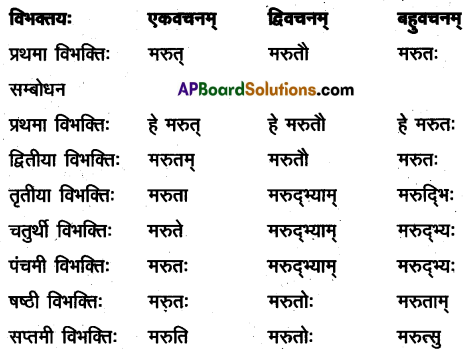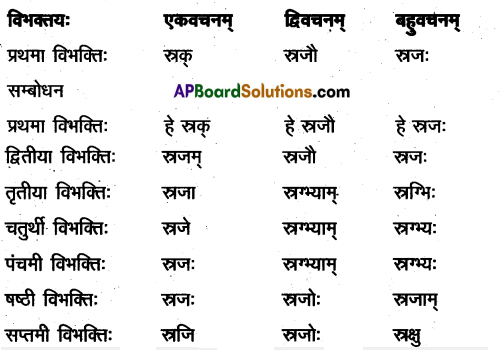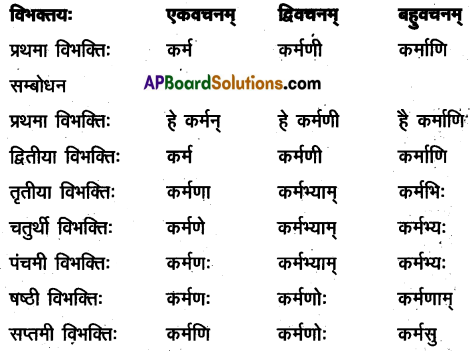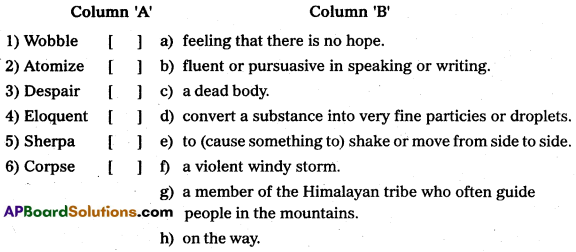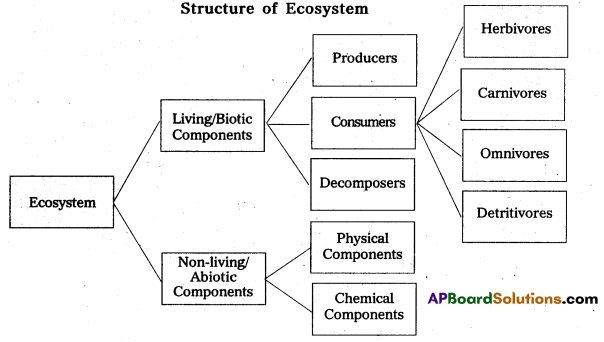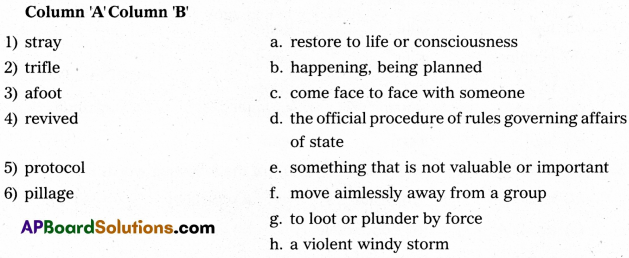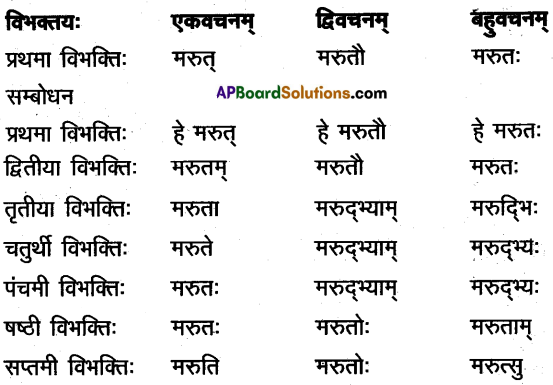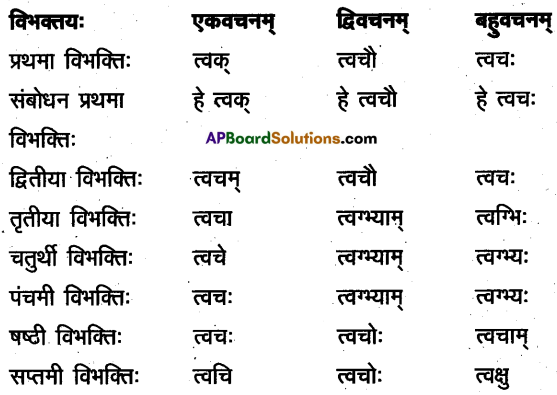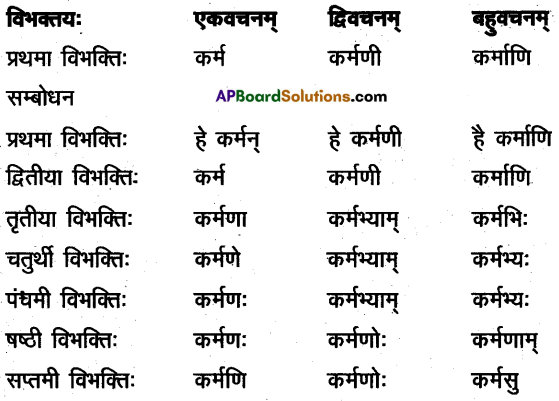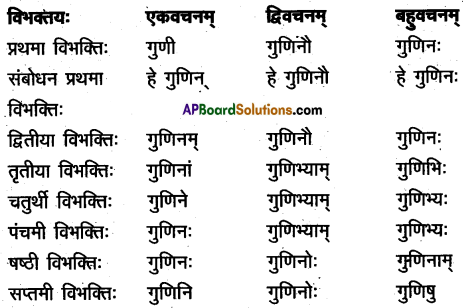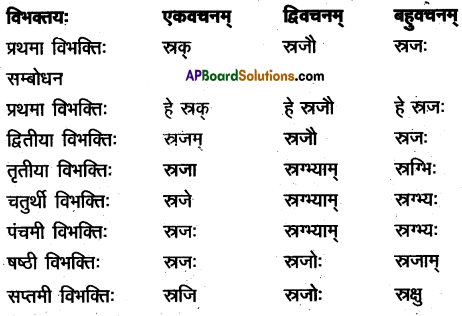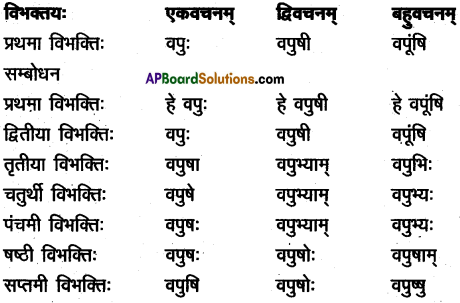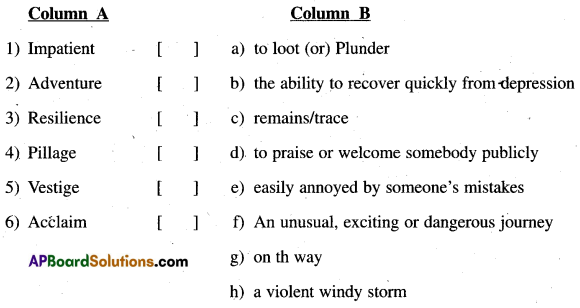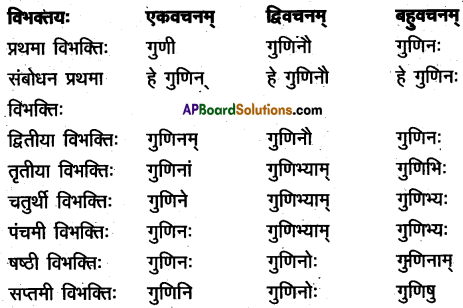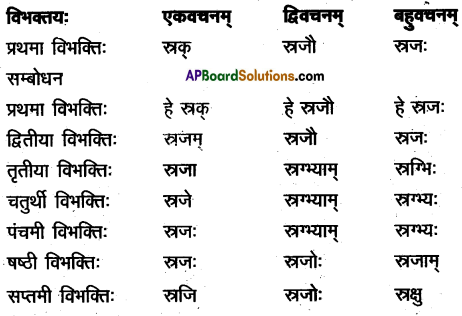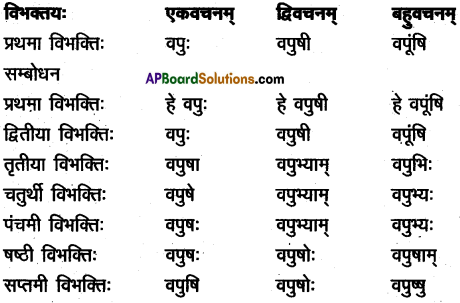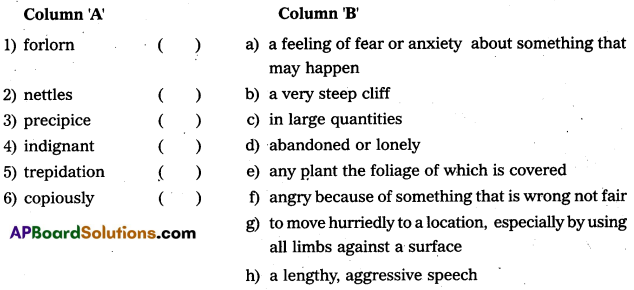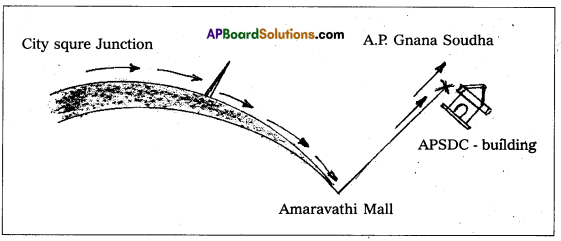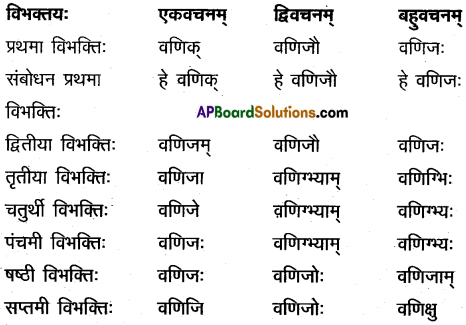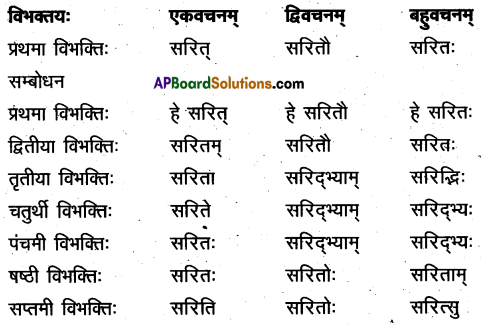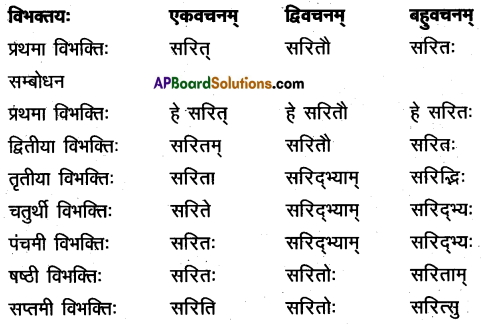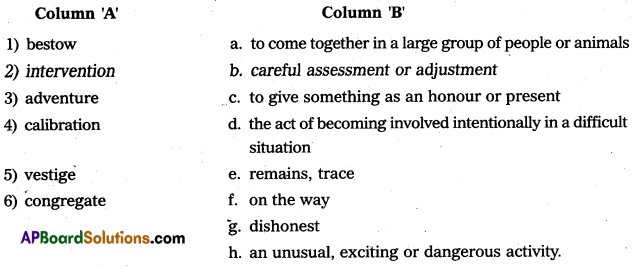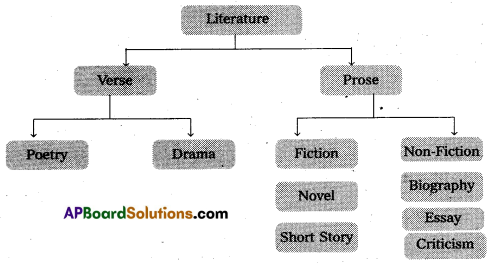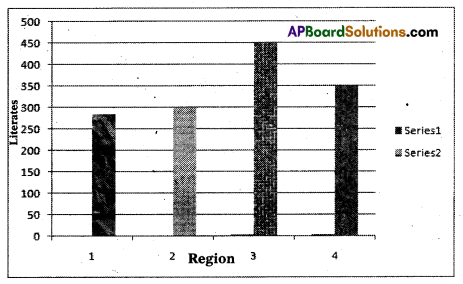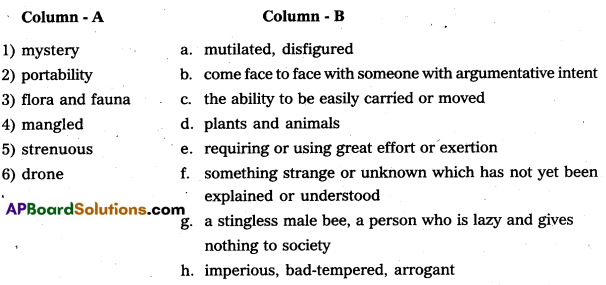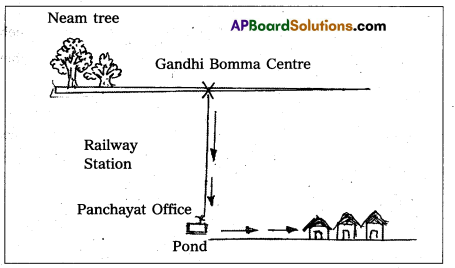Thoroughly reviewing AP Inter 1st Year English Model Papers and AP Inter 1st Year English Question Paper March 2019 helps in understanding the examiner’s expectations.
AP Inter 1st Year English Question Paper March 2019
Time : 3 Hours
Max.Marks: 100
Section – A
(a) Universities are hope of our national leaders.
Answer:
Context : This passage is taken from the lesson “What makes a nation”. C. Rajagopalachari made an inspiring speech at the Nagpur Institute of Technology in the 1948. While giving suggestions to the students, he spoke about some of the important points to be noted by the students.
Explanation: While making a speech at the Nagpur Institute of Technology, in his concluding words1 he pointed out the importance of the universities. Leaders gave preference2 to education. They started universities to produce educated3 youth. India’s independence could be safe guarded4 only when the culture of this country had been enriched. Honesty and hard work could be maintained by the university student. Everything shall be good and worthy5 only when the aims of our national leaders become true. Thus the importance of the universities is stressed6.
General Relevance: India, at the time of the function, was simply a baby in Independence.7 Political leaders were trying to develop the country in all the spheres.8 Universities were also developed, to impart9, discipline and to bring awakening10 in the minds of the people.
1. పూర్తిచేస్తున్న మాటలు
2. ప్రత్యేకత
3. చదువుకొనిన
4. కాపాడబడిన
5. తగినట్టి
6. నొక్కిచెప్పబడెను
7. స్వాతంత్య్రము
8. రంగములలో
9. నేర్పుట
10. మేల్కొలుపు
సందర్భము : సి. రాజగోపాలాచారి రచించిన “What Makes a Nation” అనబడే పాఠం నుండి ఈ లైను తీసికొనబడినది. సి. రాజగోపాలాచారి చాలా భావస్ఫోరకమైన సంభాషణ చేశాడు. ఇది నాగపూరు Institute of Technology లో 1948లో ఇవ్వబడినది. ఆయన సలహాలనిస్తూ విద్యార్థులకు కొన్ని ముఖ్యమైన గమనింపదగిన మాటలు చెప్పారు.
వివరణ : తన సంభాషణ కొనసాగిస్తూ, నాగపూర్ టెక్నలాజికల్ ఇన్స్టిట్యూట్లో మాట్లాడుతూ ఆయన యూనివర్సిటీల గురించి మాట్లాడారు. నాయకులు చదువుకు ప్రాధాన్యతనిచ్చారు. చదువుకొన్న యువత కొరకు వారు యూనివర్సిటీలు ప్రారంభించారు. దేశం యొక్క సంస్కృతి నిలబెట్టినప్పుడే భారతదేశం యొక్క స్వాతంత్య్రము కాపాడబడుతుంది. నిజాయితీ, కష్టపడి పనిచేసే తత్వము అనునివి యూనివర్శిటీ విద్యార్థి అలవరచుకొనాలి. మన జాతీయ నాయకుల అభిప్రాయములు నిజమైనప్పుడే ప్రతి విషయము మంచిగాను, తగినదిగాను ఉంటుంది. ఈ విధంగా యూనివర్శిటీల గొప్పతనం నొక్కి చెప్పబడినది.
సాధారణ భావన : ఈ ఫంక్షన్ సమయంలో, స్వాతంత్ర్యం విషయంలో ఒక పసిబిడ్డ వంటింది. అన్ని రంగాలలో దేశాన్ని అభివృద్ధి పరచాలని నాయకులు ప్రయత్నిస్తున్నారు. క్రమశిక్షణ నేర్పడానికి, ప్రజల మనస్సులు వికాసవంతం చేయడానికి యూనివర్శిటీలు . అభివృద్ధి చేయబడ్డాయి.
(b) Someday I will prove, without a doubt, the truth of what happened to me.
Answer:
Context : This passage is taken from the prose lesson “She Conquered Everest”. Which was compiled by Dr. B. Sowjanya. It is about the courageous lady Arunima Sinha and her life ambition.
Explanation: Arunima Sinha was injured1 in her train journey to Delhi. She was thrown on the other track, by the criminals. A train ran over her left leg. She was amputated2. She was in the hospital bed for recovery3. A rod was inserted in her right leg. In spite of all this, she had a firm opinion to withstand4 the challenge. She said that she would one day come out of the calamity5 and would prove to be successful. In her words, she expressed her inner passion6 to scale the Everest. Anyhow she was successful.
General Relevance: To reach the goal in one’s life is a great thing. But it involves a lot of effort. The obstructions could not deter her decision and she climbed the mountain. Many people were amazed at this deed.
1. గాయపడెను
2. అవయవము కోయబడుట
3. కోలుకొనుట
4. సహించుట, ఎదిరించి నిలబడుట
5. ఇబ్బంది
6. గట్టివాంఛ
7. ఎక్కుట
8. కలిగించుట
9. చలింపజేయుట
10. ఆశ్చర్యపడుట
సందర్భము : డా॥ సౌజన్య గారు సేకరించిన, “She Conquered Everest” అనే పాఠములో నుండి ఈ ప్యాసేజి తీసుకొనబడింది. అది, ధైర్యము గల అమ్మాయి అయిన అరుణిమ సిన్హా మరియు ఆమె యొక్క జీవితాశయం గురించినదై యున్నది.
వివరణ : ఢిల్లీ వెళుతున్న ప్రయాణంలో అరుణిమ సిన్హా గాయపడ్డారు. ఆ నేరస్తులు ఆమెను అవతలి ట్రాక్ మీదకి విసరివేశారు. ఒక రైలు ఆమె యొక్క ఎడమ కాలి మీదుగా పోయింది. ఆమె కాలు తెగగొట్టారు. ఆమె బాగుపడడానికి ఆసుపత్రిలో బెడ్ మీదనున్నారు. ఆమె కుడికాలిలో ఒక రాడ్ పెట్టారు. ఆమె ఇన్ని బాధలున్నా తన యొక్క ఛాలెంజిని విరమించలేదు. ఒకానొకదినాన ఆమె తన ఇబ్బందుల నుండి బయటికివచ్చి తనను తాను నిరూపించుకొనగలనంటున్నది. ఆమె తన మనసులోని కోరిక, ఎవరెస్టునధిరోహించాలనే ఆలోచనను ఈ మాటలలో వ్యక్తపరిచారు. ఏది ఏమైనా ఆమె జయంపొందారు.
సాధారణ భావన : గమ్యం చేరగలగడం అనేది ఒక వ్యక్తి జీవితంలో చాలా గొప్ప విషయం. కానీ దానికి చాలా శ్రమ అవసరము. ఆటంకములు ఆమె మనస్సులో నిర్ణయాన్ని మార్చలేకపోయింది. ఆమె ఆ పర్వతాన్ని ఎక్కారు. చాలా మంది ప్రజలు ఆ పనిని బట్టి ఆశ్చర్యపడ్డారు.

(c) India Meteorological Department has strengthened India’s capacity to prepare for and cope with disasters.
Answer:
Context : This line is taken from the essay “Disaster Management” compiled by Dr. A. Madhavi Latha. It is about disaster management. The essay is informative and useful.
Explanation: The writer gives a definition for disaster management. Then she wants to tell about the Meteorological1 Department. Disaster management is a great subject useful for the whole of the world. NIDM was started and some important steps to have awareness2, preparedness and mitigation have been taken up. Forecast and warning informations are to save people in havoc3. Software application also is arranged by these institutions. So department is doing a lot for the disaster management.
General Relevance: When there is a problem for the people, it is to be addressed by the government. Here the Meteorological department of the government of this country is working for the safety of the people and so it leads an important role4 in disaster management.
1. వాతావరణ శాస్త్రము
2. ఎరుగుట, తెలిసికొనియుండుట
3. విపత్తు
4. పాత్ర
సందర్భము : డాక్టరు ఏ. మాధవీలత గారు సంకలనం చేసిన “Disaster Management” అనబడే వ్యాసము నుండి ఈ లైను తీసికొనబడినది. అది disaster management ను గురించినదై యున్నది. ఈ వ్యాసము విషయ పరిజ్ఞానము కలది మరియు ఉపయోగకరము.
వివరణ : Disaster management అను పదమునకు చెబుతున్నారు రచయిత. అప్పుడు ఆమె వాతావరణ శాస్త్రము గురించి చెప్పారు. Disaster management అనునది ప్రపంచమంతటికి ఉపయోగపడే విషయము. NMDM ప్రారంభించబడి, విషయ పరిజ్ఞానము, సిద్ధపాటు మరియు నష్టము తగ్గించుకొనుట అను విషయములు చేపట్టి కొన్ని ముఖ్యమైన అడుగులు వేశారు. ముందుగానే ఊహించి గ్రహించుట మరియు Warning Information ఇచ్చి ప్రజలను విపత్తు నుండి రక్షించడానికి ప్రయత్నించారు. ఈ సంస్థలు software కూడా ఉపయోగిస్తున్నారు. కనుక ఈ డిపార్ట్మెంట్ డిజాస్టమేనేజిమెంటు కొరకు చాలా చేస్తున్నది..
సాధారణ భావన : ప్రజలకు సమస్య వుంటే ప్రభుత్వము దానిని తీర్చాలి. ఈ వాతావరణశాస్త్ర డిపార్ట్మెంట్ వారు ప్రజల క్షేమం కొరకు ప్రయత్నిస్తున్నారు. కనుక disaster management లో అది ప్రధాన పాత్ర పోషిస్తుంది.
(d) Teach him to have faith in his own ideas, even if everyone tells him they are wrong.
Answer:
Context : This passage is taken from the lesson “Abraham Lincoln’s Letter to His Son’s Teacher” written by Abraham Lincoln, the noted 16th President of the U.S.A. It is about his appeal to the teacher, in instructing a boy of tender age.
Explanation: The author advises the teacher to be careful in his dealing with the boy. The boy must become an individual having complete knowledge of the world. He should know the mystery1 in the creation of birds, bees and flowers. He should be a dependent upon himself. He should not blindly follow the crowds. After listening to everybody, he should conclude2 himself to do whatever he wants to do. Thus he should become an individual with virtue3.
General Relevance: It is general for one to consider the opinion of the crowds, but a teacher, according to the author, should guide the boy in the right direction to decide the way for himself. A boy should become resolute1 in his decisions.
1. విచిత్రము
2. పూర్తిచేయుట
3. సుగుణము
4. మార్పులేని నిర్ణయము కలిగియుండుట, నిబ్బరముగానుండట
సందర్భము : “Abraham Lincoln’s Letter to his Son’s Teacher” అనే పాఠము నుండి ఈ వాక్య భాగము తీసుకొనబడినది. దీనిని USA కు 16వ రాష్ట్రపతియైన అబ్రహాంలింకన్ వ్రాశారు. చిన్న వయస్సులో నున్న బాలునికి ఎలా చదువు చెప్పాలి అనే విషయమై ఆయన చేసిన విజ్ఞాపన.
వివరణ : రచయిత, ఆ బాలునితో జాగ్రత్తగా వ్యవహరించవలెనని ఉపాధ్యాయునికి సలహా ఇస్తున్నాడు బాలుడు ఈ ప్రపంచంలో జ్ఞానము కలిగినవాడుగా సిద్ధం కావాలని చెప్పారు. పక్షులు, తేనెటీగలు మరియు పూల మొక్క సృష్టి చాలా విచిత్రము అని అతడు, తెలిసికొనాలి. అతడు తన మీదనే తాను ఆధారపడియుండాలి. అతడు సమాజాన్ని గ్రుడ్డిగా అనుసరించరాదు. ప్రతివారు చెబుతున్నది విని, అతడు తాననుకొన్నది తను చేసే పద్ధతిలో ఉండాలి. ఈ విధంగా అతడు మంచి గుణములు కలిగినవాడు కావాలి.
సాధారణ భావన : సహజంగా జనం యొక్క ఉద్దేశాన్ని పరిశీలించడం అనేది సహజమైన విషయము. కానీ రచయిత ఉద్దేశం ప్రకారం, ‘బాలుణ్ణి సరియైన మార్గంలో నడిపించాలి. అతడు తన మార్గంతానే నిర్ణయించుకొనగలిగేలా చేయాలి. ఒక అబ్బాయి తన నిర్ణయముల విషయములో నిబ్బరంగా ఉండాలి.
2. Annotations (Poetry) :
(a) To break this shadow into a thousand lights of sun, into a thousand wirling dreams of sun.
Answer:
Context: These lines are taken from the poem “As I Grew Older’ written by the Black Poet Langston Hughes. The poem is filled with the revolting aims of the black people in America. His former views about his dream are given here.
Explanation: The poet had an impediment1 on his way to realise his dream. It was as big as a wall touching the sky. The wall was there between the individual and his dream. The person was left in its shadow2. There was no other go except to yield3 to the circumstances.
He could not strike the wall and so he could not go into the light of the Sun. But, the person had a decisive4 mind. He knew that the problem was strong. But he smashed5 the walls of race. He broke it into pieces. There was no trace of it actually the race discrimination6 was thrown away from the country through the effects of great leaders like Abraham Lincoln. The poet waited patiently7, put his energies into the struggle and finally got it. This the bright light of thousand suns shone over the thousand dreams of the aspirants.
General relevance: The problem was very powerful. The people suppressed8 were many. But there was a great struggle. Everyone participated in it. The poet got his dream succeeded because, he had a decisive mind.
1. ఆటంకము
2. నీడ
3. లోబడుట
4. నిర్ణయాత్మకమైన
5. నాశనమైన
6. జాతి వివక్షత
7. ఓర్పుగా
8. అణచివేసెను
సందర్భము : Langston Hughes అనబడే నల్లజాతి కవి వ్రాసిన “As I Grew Older” అనే పద్యం నుండి ఈ వాక్యములు తీసుకొనబడినవి. ఈ పద్యము అమెరికాలోని నల్లజాతి ప్రజల తిరుగుబాటు, ఆలోచనలతో నిండియున్నది. ఆయన కల పట్ల ఆయనకు గల ప్రాథమిక ఆలోచనలు ఇక్కడ ఇవ్వబడినవి.
వివరణ : తన కల నెరవేరడానికి, కవికి ఒక ఆటంకము ఉంది. ఆకాశాన్నంటే గోడంత ఎత్తున ఉన్నది. ఆ వ్యక్తికి, ఆ కలకు మధ్య అడ్డుగోడగా ఉండెను. ఆ వ్యక్తి దాని నీడలోకి వెళ్ళెను. పరిస్థితులకు లోబడుట తప్ప వేరొక దారి లేదు. ఆ గోడను తాను పడగొట్టలేడు గనుక సూర్యుని వెలుగులోనికి వెళ్ళలేడు. కానీ ఆయనకు నిర్ణయాత్మకమైన మనసుంది. ఆ సమస్య బలమైనది అని ఆయనకు తెలుసు. కానీ జాతి గోడలను నాశనం చేశాడు. దానిని ముక్కలుగా చేశాడు. వాటి గురుతులే లేవు. వాస్తవంగా అబ్రహాం లింకన్ వంటి ‘గొప్ప నాయకుల ప్రయత్నముల చేత ఈ జాతి వివక్షత పారద్రోలబడింది. కవి ఓర్పుగా ఎదురు చూశాడు. తన శక్తిని ఉపయోగించాడు మరియు చివరికి సాధించాడు. ఈ విధంగా వేయి సూర్యుల కాంతి, ఆ వేయి కలలు గంటున్న వారిపై ప్రకాశించింది.
సాధారణ భావన : ఈ సమస్య చాలా శక్తివంతమైనది. ఎంతోమంది అణచివేయబడ్డారు. కానీ గొప్ప పోరాటం జరిగింది. అందరూ పాల్గొన్నారు. కవి తన కలను నెరవేర్చుకున్నాడు. ఎందుకంటే ఆయనకు గట్టి నిశ్చయత ఉంది.
(b) I know why your eyes leap away when they meet mine, why they quickly stray from their quiet contact.
Answer:
Context: These lines are taken from the poem ‘To A Student’ written by Kamala Wijeratne. In this poem the poet gives a message to the youth. This world is filled with hatred and bloodshed. A student should understand the real atmosphere and try to pursue peace and hormony.
Explanation: In these lines, the poet expresses her worry at the students attitude. He could not look straightly into the eyes of the teacher. His ears have been filled with the news of bloodshed and hatred. So the student is afraid of the statement of the teacher. News of dangerous incidents, ethnic conditions, landmines, explosions, splinters of bones is heard by the student. So, the poet thinks it correct for the student to turn away his eyes and ears to the advice of the teacher. The poet fights against the day to day cruel events.
General relevance: The poet’s view that it is correct for the student to be a verse to any of the advice given by a teacher, seems to be correct. The anguish in the mind of the poet about the pitiable condition of the students is clearly shown in these lines.
సందర్భము : కమలా విజేరత్నే వ్రాసిన ‘To A Student’ అనబడే పద్యము నుండి ఈ వాక్యములు తీసుకొనబడినవి. ఈ పద్యంలో ఆ కవి యువతకు మంచి ఉపదేశము ఇస్తున్నారు. ప్రపంచమంతా ఏహ్యభావము మరియు యుద్ధము అనే వాటితో నిండిపోయి ఉన్నవి. విద్యార్థి నిజమైన వాతావరణమును గ్రహించి శాంతి, సమగ్రతలను సాధించడానికి ఉద్యుక్తుడు కావాలి.
వివరణ : ఆ విద్యార్థి యొక్క పరిస్థితిని బట్టి కవి, తన యొక్క ఆందోళన తెలుపుచున్నారు. ఆ ఉపాధ్యాయుని కళ్ళల్లోనికి అతడు సూటిగా చూడలేకపోతున్నాడు. రక్తపాతము మరియు ఏహ్యభావమునకు సంబంధించిన వార్తలతో అతని చెవులు నిండిపోయి ఉన్నది. అందుచేత ఆ విద్యార్థి ఉపాధ్యాయుని ప్రకటన పట్ల భయపడుతున్నాడు. ప్రమాదకరకమైన సంఘటనలు రక్తపాతము గల స్థితులు, మందుపాతరలు పేల్చివేతలు, ఎముకల ముక్కలు చెల్లాచెదురగుట మొదలైన వారి వార్తలు అతనికి వినబడుతున్నాయి. అందుచేత ఆ విద్యార్థి తన ముఖమును త్రిప్పుకొని, తన చెవులతో వినకుండా ఉండడం సమంజసమే అని ఉపాధ్యాయుడనుకొంటున్నారు. రోజురోజుకు జరుగుతున్న క్రూరమైన సంఘటనలకు వ్యతిరేకంగా కవి పోరాడుతున్నారు.
సాధారణ భావన : ఒక ఉపాధ్యాయుని నుండి వచ్చే ఏ విధమైన సలహాలనైనను వినకుండా విద్యార్థి వ్యతిరేక భావన చూపడం అనేది సరియైనదే అని కవి అనుకొంటున్నారు. కవిగారి మనసులోని ఆందోళన అనగా ఆ విద్యార్థి యొక్క దీనస్థితిని బట్టి కలిగిన దయనీయమైన భావన ఈ వాక్యములలో కనబడుతున్నది..
(c) Give me the strength never to disown the poor.
Answer:
Context: These lines are extracted from the poem “This is my Prayer to thee my Lord” written by Rabindranath Tagore. He was a Nobel laureate and his poems are filled with philosophy. Here this small poem is a prayer to God to make him a real follower.
Explanation: Rabindranath Tagore’s prayer is honest. He prays to the God Almighty1 to make him successful in his deeds of love. He wants to have equanimity both at happiness and at difficulties. He wants to show affection2 towards the poor and the needy. His mind should rise to the supreme level of showing love at others without selfishness. He wants to utilise3 his strength for the good of the people.
General relevance: The prayer is a universal4 appeal. It pertains to the world of truth, love and service. It is a general ambition that the righteous5 people aim at.
1. సర్వ శక్తిమంతుడు
2. ప్రేమ
3. ఉపయోగించుకొనుట
4. విశ్వజనీయమైన
5. నీతిగల, సత్యవంతులైన
సందర్భము : ఈ వాక్యాలు రవీంద్రనాథ్ ఠాగూర్ గారు రచించిన ‘This is my Prayer to thee my Lord’ అనే ఈ పద్యం నుండి తీసుకొనబడినవి. ఆయన నోబెల్ బహుమతి గ్రహీత మరియు ఆయన పద్యములు వేదాంతముతో నింపబడినవి. ఈ చిన్న పద్యము, నిజమైన follower గా దేవునికి ప్రార్థించే విధానము అయి ఉన్నది.
వివరణ : రవీంద్రనాథ ఠాగూర్ గారు పద్యంలో చాలామంచి వివరణలు ఇచ్చారు. ఆయన తన జీవితంలో స్థిత ప్రజ్ఞత కలిగి ఉండాలి. ఈ పద్యంలో చెప్పబడిన స్థితప్రజ్ఞత అనే నీతి జీవితంలో చాలా ముఖ్యమైనది. ఈ రెండు విషయాలలో సమతౌల్యం ఉండాలి. సంతోషంలో మరియు విచారంలో హృదయం పాడుచేయబడరాదు. మిగతా చిన్న చిన్న విషయాలన్నింటిని అధిగమించి, ఉన్నతమైన భావాలతో నిండిన మనస్సును కోరుతున్నారు.
సాధారణ భావన : ఠాగూరు గారి ప్రార్థన గొప్ప కోరికలతో నిండియున్నది. బీదవారికి, అవుసరలతో ఉన్న వారికి ప్రేమ, అనురాగము చూపాలి. అట్టివారి పట్ల విజయవంతమైన ప్రేమను ఆశిస్తున్నారు.

(d) Others, like soldiers armed in their stings make boot upon the summer’s velvet buds.
Answer:
Context: These lines are taken from the poem “Common Wealth of Bees” written by Shakespeare. It is extracted from the play Henry V, Act I and Scene 2. The example of a beehive1 is given here, by the dramatist, to bring a lesson.
Explanation: William Shakespeare describes the Beehive with all its specialities1. There is the king bee around which all the other bees surround. There are worker bees, male bees, soldier bees and others. The soldiers have stingers2 to fight against the enemy. The soldiers make an expedition upon the beautiful and tender3 flowers. They make a booty of honey and return to the hive. In summer we see these busy bees running towards the plants. Sometimes, we use their stings4 against the enemy. Similarly, the citizens of a kingdom should do their duty carefully and save the king and the kingdom. At every level of this work, there is discipline and the bees make a good example of this activity5.
General relevance: A group of bees in a hive, does whatever work is given to it. The soldier bees work hard and collect honey to save it in the beehive. Sometimes they are like soldiers going against the enemy and often they are soldiers to fight and collect the booty from the gardens.
1. ప్రత్యేకతలు
2. కుట్టేముళ్ళు
3. సున్నితమైన
4. ముళ్ళు
5. పని
6. సంపద, ఎక్కువ ప్రయోజనాలు
సందర్భము : విలియం షేక్స్పియర్ వ్రాసిన Common Wealth of Bees అనే పద్యం నుండి ఈ వాక్యములు తీసుకొనబడినవి. అది హెన్రీ – V, మొదటి Act, 2వ సీను నుండి తీసుకొనబడినది. ఒక తేనెపట్టు యొక్క ఉదాహరణ, ఒక పాఠము కొరకు ఇవ్వబడినది.
వివరణ : షేక్స్పియర్ ఒక తేనెపట్టును గురించి, దాని ప్రత్యేకతలను గురించి వర్ణించారు. రాజు ఈగ చుట్టూ మిగతా ఈగలు ప్రోగవుతాయి. శ్రామిక ఈగలు, మగ ఈగలు, సైనిక ఈగలు మరియు ఇతరములున్నాయి. శత్రువుతో పోరాడడానికి సైనిక ఈగలు ముళ్ళు కలిగియున్నవి. అందంగా, సున్నితంగా ఉన్న పూలమీద అవి దండయాత్ర చేస్తాయి. అవి విస్తారంగా తేనెను సంపాదించిన ఇంటికి చేరుతాయి. వేసవిలో ఇవి మొక్కలవైపు వెళ్ళడం చూస్తాము. కొన్నిసార్లు అవి తమ శత్రువుల మీద ముల్లు గుచ్చుతుంది. అదే విధంగా ప్రజలు, రాజును, రాజ్యాన్ని జాగ్రత్తగా చూచుకొనడానికి ప్రయత్నించాలి. ఈ పనిలో ప్రతిస్థాయిలో క్రమశిక్షణ ఉన్నది. తేనెటీటలు దీనికి మంచి ఉదాహరణయై ఉన్నది.
సాధారణ భావన : ఒక తేనెపట్టులోని ఈగలు వాటికివ్వబడిన దానిని చేస్తాయి. సైనిక ఈగలు కష్టపడి పనిచేసి, తేనెపట్టును తేనెతో నింపుతాయి. కొన్నిసార్లు అవి శత్రువుల మీద సైనికుల వలె ఉంటాయి. కొన్నిసార్లు అవి సైనికులుగా ఎక్కువ మొత్తంలో తేనెను, తోటల నుండి తెస్తాయి.
3. Paragraph Questions (Prose):
(a) What is Rajaji’s advice to the students of higher learning ?
Answer:
C. Rajagopalachari gave an inspiring speech at Nagpur Institute of Technology in the year 1948. He was a statesman and an orator. He was very happy to listen1 to the speech made by a girl student. He thought that a new trend2 had emerged3 in the society. Girl students are competing with boys. The youth of India has to maintain good character. They should live upto the standards of India. The country had a great tradition4. They should become good bricks in the construction5 of a nation. Honesty6 and hard work should be maintained by the students. Straight forwardness7 is needed at every stage. As we got independence we should accept our responsibility and should make the nation strong.
1. వినుట
2. విధానము
3. వేగంగా వచ్చెను
4. సంప్రదాయము
5. కట్టడము
6. నిజాయితీ
7. ఋజుమార్గవర్తన
శ్రీ రాజగోపాలచారి 1948లో నాగపూరు ఇన్స్టిట్యూట్ ఆఫ్ టెక్నాలజీలో ఒక భావస్ఫోరకమైన సంభాషణ చేశారు అతడు మంచి రాజనీతిజ్ఞుడు మరియు ఉపన్యాసకుడు. ఒక అమ్మాయి మాట్లాడినది ఎంతో సంతోషంగా విన్నాడు. ఒక నూతన ఒరవడి ప్రారంభమైనది అనుకొన్నాడు. విద్యార్థినులు, విద్యార్థులతో పోటీపడుతున్నారు. భారతదేశపు యువత మంచి ప్రవర్తనను నేరపాలి. భారతదేశపు ప్రమాణములకు తగినట్లు బ్రతకాలి. ఈ దేశానికి ఒక మంచి సంప్రదాయము కలదు. ఈ జాతి నిర్మాణములో వారు మంచి రాళ్ళుగా తయారు కావాలి. విద్యార్థులు నిజాయితీ, కష్టపడి పనిచేయుట అనునవి అలవాటు చేసికొనాలి. ఋజుమార్గ వర్తన అనునది ప్రతిస్థాయిలో కావాలి. మనకు స్వాతంత్ర్యము వచ్చింది గనుక మన బాధ్యతను అంగీకరించి, ఈ జాతిని బలపరచాలి.
(b) How can the teacher instill faith, love and courage in Lincoln’s son ?
Answer:
Abraham Lincoln wrote a letter to the teacher of his son. His letter is filled with a number of suggestions to the teacher. The teacher should be careful in his dealing with the boy. The boy should be adventurous1. He should know that a friend should be seen in an enemy. His behaviour with others should be gentle2. Cynicism should not be encouraged. He must be adventurous to tackle wars, tragedy and sorrow. Faith in himself leads to faith in mankind3. Thus faith, love and courage could be instiled4 in Lincoln’s son.
1. ధైర్యము కలిగిన వాడు
2. సున్నితంగా
3. మానవజాతి
4. పాదుకొల్పుట, కలుగజేయుట
అబ్రహాంలింకన్ తన కుమారుని ఉపాధ్యాయునికి ఒక ఉత్తరం వ్రాశారు. ఆ ఉత్తరంలో ఉపాధ్యాయునికి ఎన్నో సలహాలున్నవి. ఉపాధ్యాయుడు, ఆ బాలుని పట్ల బహుజాగ్రత్తగా వ్యవహరించాలి. ఆ అబ్బాయి ధైర్యశాలి అయియుండాలి. ఒక శత్రువులో ఒక మిత్రుణ్ణి చూడగలిగి యుండాలి. ఇతరులతో అతని ప్రవర్తన సౌమ్యంగా ఉండాలి. ఇతరుల అభివృద్ధిని ఓర్చలేని లక్షణాన్ని ప్రోత్సహించరాదు. యుద్ధాలు, బాధలు, విచారాలను ధైర్యంగా ఎదుర్కొవాలి. తన మీద తనకు నమ్మకముంటే అది మానవజాతి మీద నమ్మకం కలిగిస్తుంది. ఈ విధంగా విశ్వాసము, ప్రేమ మరియు ధైర్యము అను వానిని లింకన్ గారి కుమారునిలో నింపాలి.
(c) How does information technology, according to Abdul Kalam and Rajan, change the agriculture sector ?
Answer:
APJ Abdul Kalam and Y.S.Rajan wrote the essay “Digital Technologies”. They have a vision for India in all its development. Digital technology is useful to develop the sectors of Agriculture, Industry and Service. Agriculture sector should use Information Technology more intensity1. Monitoring the crops2, soil3 conditions, water resources4, better weather forecasts, marketing of the products should be connected with these new technologies. Then only agriculture can be developed to make India self sufficient.
1. బలంగా
2. పంటలు
3. నేల
4. వనరులు
APJ Abdul Kalam మరియు Y.S.రాజన్ అనువారు “Digital Technologies” అనబడే ఈ వ్యాసాన్ని వ్రాశారు. వారు భారతదేశము యొక్క అభివృద్ధిని గురించి ఒక vision (దార్శనికత) కలిగి యున్నారు. డిజిటల్ టెక్నాలజీ అనునది, వ్యవసాయము, పరిశ్రమలు మరియు సేవా రంగములు అభివృద్ధి చెందుటకు పనికి వస్తుంది. వ్యవసాయరంగము, ITని పూర్తిగా ఉపయోగించుకోవాలి. పంటలు పండించుట, నేల స్వభావములు, నీటి వనరులు, మంచి వాతావరణ అంచనాలు, తయారయిన వస్తువుల యొక్క వ్యాపారము మొదలైనవి. ఈ క్రొత్త technologies కు సంధానం చేయాలి. అప్పుడే వ్యవసాయము అభివృద్ధి చెంది, భారతదేశము స్వయం సమృద్ధమవుతుంది.
(d) What are the difficulties faced by Arunima while climbing Everest? What do you learn from her story?
Answer:
Dr. B. Sowjanya compiled the particulars of the life of Arunima Sinha, with the title. She Conquered Everest. Arunima Sinha got her left leg amputated and a rod was inserted1 in the right leg. She had firm decision to go over the Everest. She did a basic course in mountaineering. She took the blessings of Bachendripal. As she started climbing the mountain, the ankle2 and heel3 were swiveling. She was losing grip. There was severe pain in the other leg. At a height of 3500 feet, on the death zone, there were many dead bodies and she was not afraid of the situation4. Eventhough oxygen was less in quantity, she moved forward and reached the summit5 on 21st May 2013. Even after that she was in a critical6 position. Her helper brought a new cylinder of oxygen and thus she could survive. The confidence and courage saved7 her. From her life, everybody should learn that all the obstructions8 could be put aside9 when there is a strong will and continuous effort.
1. లోపల వుంచబడెను
2. మడమ
3. మడమను కప్పియుంచే తొడుగు
4. పరిస్థితి
5. శిఖరము
6. విపత్కరమైన
7. కాపాడెను
8. అడ్డంకులు
9. ప్రక్కను
డా॥ బి. సౌజన్య “She conquered Everest” అనే పేరుతో అరుణిమ సిన్హా యొక్క జీవిత విశేషాలను సేకరించారు. అరుణిమ సిన్హా యొక్క ఎడమకాలు తెగగొట్టబడినది మరియు కుడికాలులో ఒక రాడ్డు వున్నది. ఆమె ఎవరెస్టు మీదికి వెళ్లాలని గట్టి నిశ్చయముతో వున్నది. పర్వతారోహణలో ఒక చిన్న కోర్సు చేశారు. బచేంద్రిపాల్ అను వారి ఆశీస్సులు పొందింది. ఆమె పైకెక్కుతుండగా కాలు మడమ వేరయి పట్టు తప్పుతోంది. రెండవకాలిలో భయంకరమైన నొప్పి. 3500 అడుగుల ఎత్తు death zone లో శవాలు వున్నా, ఆమె ఆ పరిస్థితికి భయపడలేదు. ఆక్సిజన్ తక్కువగా వున్నా ఆమె ముందుకు సాగి 2013 మే 21న ఆ శిఖరాన్ని చేరుకొన్నారు. దాని తర్వాత కూడా విపత్కర పరిస్థితిలో వున్నారు. ఆమె సహాయకుడు ఒక క్రొత్త ఆక్సిజన్ సిలిండరు తేగా ఆమె రక్షింపబడింది. ఆమె నమ్మకము మరియు ధైర్యము ఆమెను రక్షించాయి. ఎన్ని అడ్డంకులు వచ్చినా వాటిని ప్రక్కన పెట్టడానికి, గట్టి నమ్మకము, ఎడతెగని శ్రమ వుంటే చాలు అని ఆమె జీవితాన్ని బట్టి ప్రతి ఒక్కరు గ్రహించాలి.
4. Paragraph Questions (Poetry) :
(a) What is the theme of the poem “As I Grew Older” ?
Answer:
Langston Hughes wrote the poem ‘As I Grew Older’. He was an African American poet. He produced a lot of literature. His literature is filled with the problems of the black people in America. ‘As I Grew Older, is an aspiration of this poet for his dream.
In the former days, the poet could not understand the problems around. As days pass by, things started to come before him. A big wall had grown between himself and his dream. It was the obstacle of race discrimination.1 The darkness of this wall, threw him into the shadow. Beyond the wall there was the bright light of the Sun. He wanted to break down2 the wall. The barrier of his race discrimination was so powerful that he could not easily do away with it. But in the heart of hearts,3 he had a belief. Without a dream, life is worthless, without achieving the dream, one could not survive4 in the world. The poet used powerful language to break the evil of the society. He wanted to smash the wall into pieces. He thought that his effort would give him spiritual strength. He wanted to prove it through his efforts. Thus the poet presented a poem, which enthused5 the reader towards superior ambitions. His dream was realised.
1. జాతివివక్షత
2. పగిలిపోవుట
3. హృదయాంతరాళాలలో
4. జీవించియుండుట
5. వేగంగా గ్రహించుట
Longston Hughes ‘As I Grew Older’ అనబడే పద్యాన్ని వ్రాశారు. ఆయన ఒక ఆఫ్రికన్ అమెరికా దేశీయుడు. ఆయన చాలా సాహిత్యము వ్రాశారు. అమెరికాలోని నల్లవారి సమస్యలతో ఈ సాహిత్యము నిండి ఉంటుంది. ‘ As I Grew Older’ అనునది కవికి తన కల పట్ల గల ఉత్సుకతయైయున్నది.
ఆయన తొలిరోజులలో కవి తన చుట్టూ ఉన్న పరిస్థితులను అర్థం చేసుకొనలేదు. రోజులు గడిచాక సమస్యలు ఆయన ముందుకు రావడం ప్రారంభమైనది. ఆయనకు ఆయన కలకు మధ్య ఒక గోడ పెరిగింది. అది జాతి వివక్షత అనే ఆటంకము. ఆ గోడ యొక్క చీకటి అతనిని ఛాయలోనికి నడిపింది. ఆ వెనుక చక్కని సూర్యుని వెలుతురున్నది. ఆ గోడను విరుగగొట్టాలని ఆయన అనుకొంటున్నాడు. జాతి వివక్ష అనే ఆటంకము అంత తేలికగా తీసివేయలేనిదిగా ఉండెను. కానీ ఆయన హృదయాంతరాళంలో అతనికి ఒక నమ్మకం ఉంది. కల లేకపోతే జీవితం వ్యర్థం. కలను సాధించకుండా ప్రపంచంలో మనిషి జీవించలేడు. సంఘంలోని చెడును తొలగించడానికి కవి గట్టి భాషను వాడారు. ఆ గోడని ముక్కలు చేయాలనుకొన్నాడు. ఆయన ప్రయత్నాలు అతనికి ఆత్మీయశక్తినిస్తాయి అనుకొన్నాడు. అతడు దానిని తన ప్రయత్నముల ద్వారా నిరూపించాలను కొన్నాడు. ఈ విధంగా విలువైన ఆశయాల వైపుకు నడిపించే ఒక పద్యాన్ని కవి మనకు ఇచ్చాడు. ఆయన కల నెరవేరింది.
(b) How unique is Tagore’s Prayer to God ?
Answer:
Rabindranath Tagore was a poet, dramatist1 and a philosopher2. He was a Nobel laureate3 for the book Gitanjali. In the 36th song of Gitanjali, Tagore submits himself to God. He prays to God to help him by means of striking at the depths4 of his heart. This prayer is aimed at getting the strength to serve the poor. His thoughts should be at the higher level. He should submit himself to God wholeheartedly5. Thus this small poem extends6 the aim of love and service. Both joys and sorrows should be taken equally. Thus the prayer is filled with unique7 ideas.
1. నాటక రచయిత
2. వేదాంతి
3. నోబెల్ గ్రహీత
4. లోతులు
5. హృదయమంతటితో
6. చెప్పుచున్నది
7. ప్రత్యేకమైన
రవీంద్రనాథ ఠాగూర్గారు ఒక కవి, నాటకకర్త మరియు ఒక వేదాంతి. ‘గీతాంజలి’ అను పుస్తకమునకు ఆయన నోబెల్ బహుమతి గ్రహీత అయినారు. 36వ పద్యంలో ఠాగూరు గారు తనను తాను భగవంతునికి సమర్పించుకున్నారు. తన హృదయపు లోతులలోనికి వెళ్ళి ఆయనను మార్చవలెనని, అట్టి సహాయము కొరకు వేడుకొన్నారు. బీదవారికి సహాయము చేయుటకు కావలసిన శక్తిని ప్రసాదించుటకు ఈ ప్రార్థన ఉద్దేశించబడినది. ఆయన ఆలోచనలు ఉన్నత స్థాయిలో ఉండాలి. అతడు హృదయపూర్వకంగా భగవంతునికి అర్పించుకొనాలి. ఈ విధంగా ఈ చిన్న పుస్తకము ప్రేమ మరియు సేవ అనే విషయాలను చూపుతున్నది. కష్టములు మరియు ఆనంధము ఒకటిగా (సమానంగా) తీసుకొనాలి. ఈ విధంగా ఈ పద్యము ప్రత్యేకత కలిగియున్నది.
(c) Explain the power of words according to the poet in the poem “Boby”.
Answer:
K. Sivareddy, a poet, in Telugu literature produced a number of books and got fame1. His poem ‘Body’ was translated into English by M. Sridhar and Alladi Uma. The body and its existence2 is described in a varied way. A body is potentially strong and it has words to make it lively. Body is like a War Ship. It is strong and proves itself to be lively by means of the usage of words. There are words useful for struggles, tears and wars. The body is like a fertile3 field, giving powerful store of words. The words coming from a womb4 strike the massive ocean5 and brings a change in the atmosphere. Some words are like arrows aimed at the opponent. Just like the continuous fire in a forest, the body is always hot and it is maintained by the heat of words. The sound of a word roars6 from the pen. Thus, words are the most activating agencies of the body. The body ignites other bodies, when they come closer and this is also possible because of the usage of words.
1. కీర్తి
2. అస్థిత్వము
3. సారవంతమైన
4. గర్భము
5. మహాసముద్రము
6. పెద్దశబ్దముతో అరచును.
కె. శివారెడ్డి అను తెలుగు కవిగారు తెలుగు సాహిత్యంలో చాలా పుస్తకాలు రచించి పేరు సంపాదించారు. M. శ్రీధర్ మరియు అల్లాడి ఉమ అనువారు Body అనే ఈ పద్యాన్ని ఇంగ్లీషులోకి తర్జుమా చేశారు. శరీరము దాని అస్థిత్వము ఒక భిన్నమైన రీతిలో వ్రాశారు. ఒక శరీరము బలం కలది మరియు దానిని సజీవంగా ఉంచుటకు మాటలుంటాయి. శరీరము ఒక యుద్ధ నౌక వంటిది. అది బలంగా వుంటుంది. మాటల ద్వారా దానిని సజీవంగా ఉంచగలుగునట్లు నిరూపించబడుతున్నది. పోట్లాటలకు, కన్నీటికి మరియు యుద్ధాలకు పనికి వచ్చుమాటలున్నాయి. శరీరము ఒక సారవంతమైన భూమి వంటిది. అది బలముగల మాటల సమూహమును కలిగియున్నది. గర్భమునుండి వచ్చుమాటలు మహాసముద్రాన్ని తాకి, వాతావరణంలో మార్పు తెస్తాయి. ప్రత్యర్థి మీద ఎక్కు పెట్టిన బాణములవంటివి కొన్ని మాటలు. అడవిలో ఎడతెగకుండా అగ్నియున్నట్లు మనిషి శరీరము ఎల్లప్పుడు వేడిగా వుంటుంది. మాటలతో ఆ వేడిని అలాగే నిలపాలి. ఆ మాటల హోరు కలం నుండి విన్పిస్తుంది. ఈ విధంగా మాటలు శరీరానికి చురుకుదనం ఇచ్చేవిగా వున్నాయి. దగ్గరకు వస్తే ఒక శరీరము ఇతర శరీరములను వెలిగించగలవు, ఇది మాటల ద్వారా కూడా సాధ్యము.

(d) According to Shakespeare, what are the lessons that human beings must learn from honey-bees?
Answer:
William Shakespeare was a play wright and a poet. He wrote a number of plays. ‘Common Wealth of Bees’ is an extract from the drama Henry V, Act I and Scene 2, Here the arch-bishop1 of canterbury gives an interesting advice to the young king. King Henry was asked to look to the bee-hive.
The bee-hive is like a common wealth. There are many bees in the hive. There is a queen bee but Shakespeare takes it as king bee in his play. Around there are worker bees. There are soldiers to fight against the enemy. Some bees cover the holes with wax. The mechanic bees are there which do their own work. All the bees work from different angles2 but for one goal. They collect honey for the whole of the crowd. They do it in order and none would swerve3 the duty. In the same manner the citizens of a kingdom should work carefully for the welfare of the kingdom.
Soldiers should be ready for war, workers to do their work, clever lawyers should work for law and order and every wing should work accordingly. The only goal is to keep the kingdom and the king safe. Shakespeare’s comparison is thought provoking4.
1. క్రీస్తు మతస్థుల ప్రధాన గురువు
2. కోణం
3. మార్గము నుండి తిప్పు
4. పుట్టించునట్టి
విలియం షేక్స్పియరు ఒక నాటక రచయిత మరియు కవి. ఆయన అనేక నాటకాలు వ్రాశారు. హేన్రీV, Act I, సీన్ 2 నుండి”Common Wealth of Bees” అనబడే ఈ భాగము తీసికొనబడింది. ఇక్కడ క్యాంటర్ బరీ ఆర్చిబిషప్ గారు, యువకుడైన రాజు ఒక మంచి సలహానిచ్చాడు. రాజుగారిని తేనెటీగల పట్టును చూడమంటున్నాడు.
తేనెపట్టు, ఒక కామన్వెల్త్ వలె వున్నది. ఆ పట్టులో అనేక ఈగలున్నాయి. దానిలో ఒక రాణి ఈగ ఉంటుంది. కానీ షేక్సి ఎయరు దానిని రాజుగా తీసికొంటున్నాడు. దాని చుట్టూ శ్రమపడే తేనెటీగలున్నాయి. శత్రువు మీద పోరాడడానికి సైనిక ఈగలున్నాయి. కొన్ని రంధ్రములను Waxతో పూడ్చుచున్నాయి. కొన్ని మెకానిక్ ఈగలు ఆ పనిని చేస్తున్నాయి. అన్ని ఈగల వేర్వేరు దిశలనుండి పని చేస్తున్నాయి గాని ఒకే గమ్యముతో చేస్తున్నాయి. అవి ఈగలన్నింటి కొరకు తేనెను ప్రోగుచేస్తాయి. అవి ఒక క్రమంలో చేస్తాయి. ఏ ఒక్కటి తన డ్యూటీని తప్పదు. అదే విధంగా ప్రతి పౌరుడూ, రాజ్యం కొరకు జాగ్రత్తగా పనిచేయాలి. సైనికులు యుద్ధానికి సిద్ధంగా వుండాలి, పనివారు పనికి తెలివైన న్యాయవాదులు న్యాయముకొరకు అలాగే ప్రతి విభాగము తనపనిలో వుండాలి. రాజ్యమును, రాజును క్షేమంగా వుంచడమే ధ్యేయంగా వుండాలి. షేక్స్పియర్ యొక్క పోలిక ఆలోచింపజేస్తున్నది.
5. Paragraph Questions (Non-detailed) :
(a) Give an account of the series of troubles the narrator experienced in the wake of winning a road engine.
Answer:
Rasipuram Krishnaswami Narayan was an Indo-Anglian writer. He wrote novels and short stories and got a great fame in the whole world. ‘Engine Trouble’ is an interesting short story.
The narrator1 won a road engine in a lottery, for a ticket purchased2 for two annas. He was happy that he got a big road engine which would bring him great fortune3. The engine was at the Gymkhana grounds and it has to be moved from that place. The Municipal authorities urged4 him to shift it. He paid rent for three months but it was burdensome5 for him and his family. He wanted to sell it. Nobody came forward to buy it.
The narrator firmly6 believed that one day it would make him rich. He requested some of the drivers to drive the engine but of no use7. There was a bargain with the secretary of a local club. The Municipal Chairman also expressed his helplessness8. The temple priest accepted to send the temple elephant to drag9 it. Fifty coolies at the rate of eight annas a day (half a rupee) got ready to push the engine from behind. The road engine had to be moved for half a furlong from the place.
The elephant was dragging the engine, the coolies were pushing10 from behind, and Joseph the driver was in the driver’s seat. A huge crowd11 gathered there. As a result of confused dragging by the elephant, the driver Joseph and coolies in their own way. The engine went straight to the opposite wall and smashed12 it. The difficulties of the narrator were multiplied13.
The dynamic world showed a way out. To his luck, a Swamiji arranged a yoga feat. He said that he would be ready to have the engine over his chest. But he needed a road engine and asked Municipal Chairmen for it. He didn’t have it. Then the narrator said that he had it. Are everything was ready to move the engine. The Swamiji’s assistant would drive the engine. Suddenly at this moment, a police officer came and stopped the show, there was no other go, for the narrator except to leave the town.
Luckily for him an earthquake hit the area. There was much damage14. Even the big Road Engine was moved into a discused well nearby. The owner of the house was very happy. The municipal authorities asked him to close it down. The engine fitted well like a cork. The owner accepted to construct the compound wall himself and also promised to pay all the expenditure, he had in that affair. When luck plucks, no one checks15. Loss to many by the earthquake, became a gain to the narrator.
1. కథను చెబుతున్న వ్యక్తి
2. కొనెను
3. అదృష్టము
4. ఒత్తిడి చేసెను
5. భారము
6. బలంగా
7. ప్రయోజనము లేని
8. నిస్సహాయత
9. లాగుట
10. వెనుక నుండి నెట్టుట
11. పెద్ద గుంపు
12. నాశనము చేసెను
13. రెట్టింపయ్యెను
14. నష్టము
15. అదృష్టము కలిసొస్తే ఎవరూ ఆపలేరు.
తెలుగు సారాంశము
రాశీపురం కృష్ణస్వామి నారాయణ్ అనువారు Indo-Anglian రచయిత. అయన నవలలు, చిన్న కథలు వ్రాసి, ప్రపంచంలో ప్రసిద్ధికెక్కారు. Engine Trouble అనునది ఆకర్షణీయమైన చిన్న కథ.
2 అణాలకు కొన్న ఒక లాటరీ టికెట్టు ద్వారా, ఈ కథకుడు ఒక రోడ్డు ఇంజను పొందాడు. ఆ పెద్ద ఇంజను అతనికి గొప్ప అదృష్టం తెచ్చిపెడుతుందని అతడు చాలా సంతోషంగా ఉండెను. ఆ ఇంజను జింఖానా గ్రౌండులో ఉండెను. దానిని అక్కడి నుండి కదపాలి. మున్సిపల్ అధికారులు, దానిని అక్కడ నుండి కదుపవలసినదిగా ఒత్తిడి చేశారు. మూడునెలలు దానికి అద్దె కట్టాడు గానీ అది భారంగా ఉండెను. దానిని అమ్మాలని అనుకొన్నాడు. ఎవరూ ముందుకు రాలేదు.
ఆ కథకుడు, తాను ఏదో ఒకనాడు అది ధనవంతుణ్ణి చేస్తుంది అనుకొన్నాడు. కొంతమంది డ్రైవర్లను అడిగినా వారు దానిని కదపలేదు. స్థానిక క్లబ్ సెక్రటరీతో సంప్రదించాడు. మున్సిపాలిటీ చైర్మన్ కూడా తన అశక్తతను ప్రకటించారు. దానిని లాగడానికి, దేవాలయ అర్చకుడు, దేవాలయ ఏనుగును పంపడానికి అంగీకరించాడు. 50 మంది కూలీలు రోజుకు 8 అణాలు (అర్ధరూపాయి) చొప్పున సిద్ధంగా ఉన్నారు. ఆ ఇంజను అక్కడి నుండి అరఫర్లాంగు దూరం కదలాలి.
ఏనుగు ఇంజనును లాగుతోంది, కూలీలు వెనుకనుండి నెట్టుతున్నారు. డ్రైవరు జోసఫ్ డ్రైవరు సీటులోనున్నాడు. పెద్దగుంపుగా ప్రజలు చేరారు. ఆ ఏనుగు కంగారుపడి తన ఇష్టము వచ్చినట్లు లాగింది. ఎదురుగా ఉన్న ఇంటి కాంపౌండు గోడకు తగిలి దానిని నాశనం చేసింది. కథకుని కష్టాలు పెరిగినాయి. అప్పుడు ఎంతో డబ్బు ఖర్చుపెట్టాలి.
ఈ ప్రపంచం మారుతూ వుంటుంది. అది ఒక మార్గం చూపింది. అదృష్టవశాత్తు ఒక స్వామీజీ ఒక యోగా కార్యక్రమం చేస్తున్నాడు. ఆ ఇంజనును తన గుండె మీద నడిపించగలనన్నాడు. ప్రతి విధమైన పని ముగించబడింది. స్వామీజీ యొక్క సహయకుడు ఇంజన్ను నడుపుతాడు. సరిగా అదే సమయంలో ఒక పోలీసు అధికారి వచ్చి దానిని ఆపివేశాడు. ఊరు విడచి వెళ్లడం తప్ప గత్యంతరం లేదు.
అదృష్టవశాత్తు ఒక భూకంపం వచ్చింది. చాలా నష్టం జరిగింది. ఆ పెద్ద ఇంజన్ కూడా ఎదురు ఇంటిలో ఉన్న పనికిరాని నూతిలో పడిపోయింది. ఆ ఇంటి యజమాని చాలా సంతోషించాడు. మున్సిపల్ అధికారులు దానిని మూసివేయమని తాకీదులు పంపారు. ఆ ఇంజన్ సరిగ్గా సరిపోయింది. తన కాంపౌండు గోడను తానే కడతానని, మరియు అప్పటివరకు అతనికి ఖర్చు తాను ఇస్తానని అంగీకరించాడు. అదృష్టం కలిసివస్తే ఎవ్వరూ ఆపలేరు. భూకంపం వలన ఎంతో మందికి నష్టము గానీ కథకునికి అది లాభదాయకమైనది.
(b) Why did Vijaya panic? Describe her reaction and anxiety about the missing of her son who had not returned home from college?
Answer:
P. Satyavathi is a noted Telugu writer. She produced a lot of Telugu stories and got reputation1 with her prize winners stories. Her stories go round the lives of women and are very interesting with humour2 and anxiety. The story is translated into English by
Y. Padmavathi.
Modern changes in life style have brought a lot of changes in thinking. Invention of Television, made a notable3 change in our daily life. Women sit before this small machine hours together and are accustomed4 to follow the stories, serials and other progra-mmes. They include horror5, envy6, revenge7 and so on. Women are habituated to think about these serials and are anxious to know the conclusion. Savitramma is the grandmother of Vijaya. Vijaya’s son is studying B.Tech. One day the boy did not return home, after the college hours.
Vijaya’s anxiety grew hour by hour. She had watched many episodes8 on the screen of the T.V. There were many stories running in her mind. Accidents while riding a motorbike, Laptop snatching by robbers and ultimate10 fightings, comments on the girl friend at a birth- day party, and ultimate death in the river fightings while swimming, cricket betting problems and several other incidents come into her mind. She was helpless11. It was late in the night and the boy had not turned up. She did not take food not even a glass of water. The grandmother was trying to comfort her. The mother was in panic12.
Vijaya was thinking in the negative13 side only. Her mind was fully dumped14 with similar events exhibited on the screen of the T.V. The grandmother was remembering similar experiences in her life and was trying to bring some solace15. Vijaya was recollecting the occasions in which she suggested the boy not to go in for anybody’s rescue. This idea was not acceptable to grandmother. She said that there should be compassion in one’s life. They were anxious but the boy did not come, even the next morning. The author did not tell about the boy’s return. It is not known whether the boy will come or not.
1. గౌరవము
2. హాస్యము
3. గమనింపదగిన
4. అలవాటుపడెను
5. భయోత్పాతము
6. అసూయ
7. ప్రతీకారము
8. భాగములు
9. లాగుకొనుట
10. తరువాతి
11. నిస్సహాయ స్థితి
12. భయోత్పాతము
13. వ్యతిరేకమైన
14. నింపెను
15. ఓదార్పు.
తెలుగు సారాంశము
పి. సత్యవతి గారు పేరుపొందిన తెలుగు రచయిత. ఆమె చాలా సంఖ్యలో తెలుగులో కథలు వ్రాసి, ప్రైజులు పొంది గొప్ప గౌరవము సంపాదించారు. ఆమె కథలు ఆడవారి జీవితాల చుట్టూ నడుస్తాయి. అవి హాస్యము మరియు ఆతురత అను లక్షణములు కలిగియుంటాయి. వై. పద్మావతి గారు దీనిని ఇంగ్లీషులోనికి తర్జుమా చేశారు.
జీవిత విధానములో ఆధునిక మార్పు, వేరైన ఆలోచనా ధోరణిని తెచ్చిపెట్టినది. T.V. ని కనిపెట్టడం మన నిత్యజీవితంలో గొప్ప మార్పు తెచ్చిపెట్టింది. స్త్రీలు ఈ చిన్న పెట్టె ముందు గంటల తరబడి కూర్చుండి, ఆ కథలను, సీరియల్స్ను మరియు ఇతర ప్రోగ్రామ్లు చూడడానికి అలవాటయ్యారు. అవి భయోత్పాతము, అసూయ, పగ తీర్చుకొనుట మొదలైనవి కలిసియుంటాయి. స్త్రీలు ఈ కార్యక్రమాలను, ధారావాహికలను చూడడానికి అలవాటుపడి, వారి ముగింపు తెలుసుకొనడానికి ఎక్కువ ఆతురత కలిగియుంటారు. సీతారావమ్మ అను ఆమె విజయగారి అమ్మమ్మ అయియున్నది. విజయ కుమారుడు B.Tech చదువుతున్నాడు. ఒకరోజున ఆ అబ్బాయి మామూలుగా కాలేజి తరువాత వచ్చే విధంగా రాలేదు.
విజయగారి ఆతురత గంట గంటకు పెరుగుతోంది. ఆమె T.V. తెరపై అనేక కథాభాగాలు చూసింది. ఆమె మనసులో అనేక కథలు మెదులుతున్నాయి. మోటారు సైకిలు నడుపుట, ల్యాప్ట్యాప్ లాగివేయుట అనంతరం యుద్ధాలు, పుట్టిన రోజు పార్టీలో స్నేహితురాలి మీద కామెంట్లు చేయుట, ఈదుతూ నదిలో మునిగిపోవుట, క్రికెట్ బెట్టింగు సమస్యలు, అలాంటి అనేక ఇతర సమస్యలు ఆమె మనసులోకి వచ్చాయి. ఆమె నిస్సహాయస్థితిలో ఉంది. గడియారం చూసింది. చాలా ప్రొద్దుపోయింది కానీ ఆ అబ్బాయి రాలేదు. ఆమె అన్నం తినలేదు. గ్లాసు నీళ్లు కూడా త్రాగలేదు. అమ్మమ్మ ఆమెను ఓదార్చడానికి ప్రయత్నిస్తోంది. తల్లి భయోత్పాతంలో ఉంది.
విజయ వ్యతిరేకంగానే ఆలోచిస్తున్నది. T.V. తెరమీద చూపబడిన, అలాంటి భయంకరమైన దృశ్యాలే కనబడుతున్నాయి. అమ్మమ్మ తన జీవితంలోని ఇలాంటి అనుభవాలను గుర్తుచేసి కొంటున్నారు. మరియు ఆమెకు ఓదార్పు కొరకు ప్రయత్నిస్తోంది. ఎవరికి సహాయానికి వెళ్లవద్దు అని తాను చెప్పిన సలహాను విజయ గుర్తుచేసికొంటోంది. ఈ విషయము అమ్మమ్మకు నచ్చలేదు. ఒక మనిషి జీవితంలో సానుభూతి ఉండాలి అంటున్నది. వారు చాలా ఆతురత పడుతున్నారు. కానీ ఆ అబ్బాయి మరుసటి ఉదయం కూడా రాలేదు. రచయిత్రి ఆ అబ్బాయి తిరిగి రావడం గురించి చెప్పలేదు. ఆ అబ్బాయి వస్తాడా, రాడా అనేది తెలియదు.
(c) Justify the statement “A diseased mind is even more harmful than the actual disease itself” with reference to O. Henry’s ‘The Last Leaf.
Answer:
O. Henry was an American short story writer. His stories have the ironic endings. They belong to the American common man1 of the 20th century. The story Last Leaf is with affection, sacrifice2 and friendship.
Johnsy and Sue were artists maintaining a studio in Newyork. Those days Johnsy was with pneumonia and she was afraid of the disease. She believed that the disease would take her life. Sue was hopeful of her friend’s survival. She was taking care of her. While drawing pictures she took old Mr. Behrman as her model paint. He was a drunkard but wanted to become a noted painter. He used to say that he would great a master piece. But everytime he failed because of his habits3 and health.
That day Sue told Behrman about the illhealth4 of Johnsy and her fear. Johnsy was looking through the window. She could see an old vine creeper5 on the other wall. The leaves of the plant were falling down and so she thought that her days were also being counted. It was her firm opinion6 that she would die as the last leaf falls down. Behrman come to know this from Sue. He could not accept the notion7 of Johnsy.
That night there was one leaf and Johnsy said that the last leaf would fall down by the next morning and that she would also die. Sue said that it was wrong. The doctor visited and said that Johnsy was completely alright. The last leaf did not fall down. It was hanging8 over there. She had some courage. The doctor said that Behrman was dead. Sue explained that Behrman painted the picture of the leaf on the wall and it saved her life. The last leaf was Behrman’s master piece. Behrman sacrificed his life painting the leaf in wind and the rain9. His leaf saved Johnsy and thus it became a master piece.
1. సామాన్యుడు
2. త్యాగము
3. దురలవాట్లు
4. అనారోగ్యము
5. తీగ
6. గట్టి భావన
7. ఉద్దేశము
8. వ్రేలాడుచున్న
9. గాలి మరియు వర్షము.
తెలుగు సారాంశము
O. హెన్రీ అమెరికాకు సంబంధించిన Short story writer అయివున్నారు. ఆయన కథలు ironic endings కలిగి ఉంటాయి. అవి 20వ శతాబ్దపు సామాన్య మానవునికి సంబంధించినవై ఉంటాయి. Last Leaf అనే ఈ చిన్న కథలో ప్రేమ, త్యాగము మరియు స్నేహభావము కనబడుతున్నాయి.
Johnsy మరియు Sue అనువారు న్యూయార్క్ ఒక స్టూడియోను నిర్వహిస్తున్న కళాకారిణులు. ఆ రోజులలో Johnsy న్యూమోనియా వ్యాధితో బాధపడుతుండెను. ఆ రోగమంటే ఆమెకు భయము కలిగింది. ఆ రోగము ఆమె ప్రాణం తీస్తుంది అని నమ్మింది. Sue తన స్నేహితురాలి ఆరోగ్యమును గురించి నమ్మకంగా ఉన్నది. ఆమె తన స్నేహితురాలిని చాలా జాగ్రత్తగా చూసుకొంటున్నది. బొమ్మలు గీసేటప్పుడు ఆమె Behrmanను మోడల్గా తీసికొంటుంది. అతడు త్రాగుబోతు మరియు తానొక గొప్ప Painter కావలెనని అనుకొంటాడు. తానొక master piece సృష్టిస్తానని అంటుంటాడు. కానీ అతని దురలవాట్లు, అనారోగ్యము కారణంగా, ప్రతిసారి సాధించలేకపోతున్నాడు.
ఆ రోజు Johnsy యొక్క అనార్యోగము మరియు ఆమె భయమును గూర్చి Sue, బెహర్మన్కు చెప్పింది. Johnsy ఆ కిటికీ గుండా చూస్తున్నది. ఆమె ఒక Ivy తీగను చూస్తున్నది. దాని ఆకులు రాలుతున్నాయి. అందుచేత తన రోజులు కూడా లెక్కింపబడుతున్నాయి అనుకొంది. ఆ చివరి ఆకులు రాలిపోతే తానుకూడా చనిపోతాననుకొంది. Behrman ఈ విషయం విన్నాడు. Johnsy యొక్క అభిప్రాయంతో అతడు ఏకీభవించలేదు.
ఆ రాత్రి ఒక్క ఆకు మాత్రమే ఉంది. Johnsy అన్నది, ‘ఆకు ఆ రాత్రి రాలిపోతుంది. తెల్లవారేసరికి తాను కూడా చనిపోతాను”, అని అన్నది. అలా కాదు అని Sue అన్నది. డాక్టరు వచ్చాడు. Johnsy పూర్తిగా ఆరోగ్యంగా ఉన్నది అన్నాడు. ఆ చివరి ఆకు రాలిపోలేదు. అక్కడే వ్రేలాడుతున్నది. ఆమెకు ధైర్యం వచ్చింది. డాక్టరు, Behrman చనిపోయాడని చెప్పాడు. Sue, బెహర్మన్ ఆ చివరి ఆకును, చిత్రించాడని అది Johnsy ప్రాణాన్ని రక్షించిందని తెలిపింది. ఆ Last Leaf అనునది Behrman యొక్క Master piece అయి యున్నది. అతడు చలిగాలి, వర్షంతో ఆ చివరి ఆకును చిత్రించాడు. ఆయన యొక్క చిత్రణ అనగా ఆ ఆకు ఆమె ప్రాణాన్ని రక్షించింది గనుక అది Master piece.
Section-B
6. Read the following passage carefully and answer the questions that follow : (5 × 1 = 5)
Whenever I hold a strategic planning session, the first value that all the executives agree on is integrity. Leaders know that honesty and integrity are foundations of lead- ership. Leaders stand up for what they believe in. For example, Jon Huntsman is a multi-billionaire who started a chemical company from scratch and grew it into a $ 12 billion enterprise. His book, Winners Never Cheat, is filled with stories taken from his own experience in which he steadfastly refused to compromise his principles. Huntsman says that integrity is the reason that he has been as successful as he is. “There are, basically, three kinds of people, the unsuccessful, the temporarily successful, and those who become and remain successful. The difference is character” he writes. Leaders with integrity are not afraid to face the truth. This is called the reality principle, or “seeing the world as it really is, not as you wish it to be.” It is perhaps the most important principle of leadership and dependent on integrity because it demands truthfulness and honesty.
Questions:
Question 1.
What are the foundations of leadership?
Answer:
Honesty and integrity.
Question 2.
What is the title of the book written by Jon Huntsman ?
Answer:
“Winners Never Cheat”
Question 3.
Name the kinds of people mentioned in the passage.
Answer:
The unsuccessful, the temporarily successful, those who become successful and remain successful.
Question 4.
Write the adjective form of the word ‘truth’.
Answer:
True.
Question 5.
The author emphasizes the importance of
(Choose the right option)
a) honesty and integrity
b) success
c) leadership.
Answer:
c) leadership.
Question 7.
Read the following passage carefully and answer the questions that follow : (5 × 1 = 5)
Throughout the 1700’s and 1800’s, continual rebellion occurred as the Indian people tried to drive the British out. The British government took control of the East India Company after a large rebellion in 1857. Conditions for the sepoys, Indian soldiers in the British army, caused unrest among them. They had lower pay than the Indians of the upper caste and saw discrimination in matters of privilege and promotion by the
British officers. The situation which finally pushed the soldiers to rebel was that tallow from cows and lard from pigs were put into the gun cartridges. The soldiers had to bite of the tallow or wax before putting them into their rifles. This offended both Muslims and Hindus for religious reasons. Mangal Pandey, a 29 year old sepoy played a key role in Sepoy mutiny. He urged the other sepoys to revolt against the British. Most of these rebels were defeated by spring, 1859. However, the revolt brought about great changes in relations between Indian and Britain.
Questions:
Question 1.
Who took control of East India Company after the rebellion in 1857 ?
Answer:
The British Government.
Question 2.
According to the passage, what does the word ‘sepoy’ mean?
Answer:
Sepoy means Indian soldiers in the British Army.

Question 3.
Who played a key role in Sepoy mutiny?
Answer:
Mangal Pandy, a 29 year old sepoy.
Question 4.
Which brought changes in relationship between India and British ?
Answer:
The revolt against the British.
Question 5.
What is antonym for the word ‘rebel’ ?
Answer:
accept.
Section – C
Note: The answers to questions in this section should be written at ONE PLACE in the answer-book separately. The entire section should be answered in one stretch and not mixed with other sections.
Question 8.
Fill in the blanks with ‘a’, ‘an’ or ‘the’ : (6 × 1⁄2 = 3)
(a) Cricket is ……… interesting game.
Answer:
an
(b) Hindus read ……… Gita.
Answer:
the
(c) My uncle is …… doctor.
Answer:
a
(d) Mr. Brown in …….. European.
Answer:
a
(e) ……… Himalayas are in the North of India.
Answer:
the
(f) Radhika is ………… orphan.
Answer:
an
Question 9.
Fill in the blanks with suitable prepositions :
(a) We have a party …….. his birthday.
Answer:
on
(b) I prefer to travel ………… train.
Answer:
by
(c) Amaravati is the capital city ……….. Andhra Pradesh.
Answer:
of
(d) I have been waiting for you ………… 7 o’clock.
Answer:
since
(e) The thieves broke down the door ………. a hammer.
Answer:
with
(f) John warned his son to keep away …….. bad company.
Answer:
from
Question 10.
Fill in the blanks with the suitable forms of the verbs given in the brackets : (5 × 1 = 5)
(a) He…………….. (study). Don’t disturb him now.
Answer:
is studing
(b) What …….. (be) your name?
Answer:
is
(c) When I entered her room, she ……. (play) the piano.
Answer:
was playing
(d) We ……… (finish) our breakfast half an hour ago.
Answer:
finished
(e) Someday I ……………… (write) a novel.
Answer:
will write
Question 11.
Rewrite the sentences as directed: (5 × 1 = 5)
(a) Roja has given me a gift. (Change the voice)
Answer:
I has been given a gift by Roja.
(Or)
A gift has been given to me by Roja.
(b) The teacher said to me, “I want to talk to you about your son’s progress”. (Change into indirect speech)
Answer:
The teacher told me that he wanted to talk to me about my son’s progress.
(c) Rahim is the best conductor. (Rewrite using “good”)
Answer:
No other conductor is as good as Rahim.
(d) This question is very difficult. I cannot answer. (Combine the sentences using too – to)
Answer:
This question is too difficult for me to answer.
(e) My brothers can’t swim. (Add a question tag)
Answer:
My brothers can’t Swim, can they?
Question 12.
Rewrite the following sentences correcting the underlined part: (5 × 1 = 5)
The entire sentence must be written.
(a) Cow is an useful animal.
Answer:
Cow is a useful animal.
(b) Look! Somebody knock at the door.
Answer:
Look! somebody is knocking at the door.
(c) She has been absent since three days.
Answer:
She has been absent for three days.
(d) Why are you angry on me?
Answer:
Why are you angry with me.
(e) When I am watching TV, the phone rang.
Answer:
When I was watching T.V., the phone rang.

Question 13.
Use ANY THREE of the following phrasal verbs in your own sentences: (3 × 1 = 3)
(a) turn off
Answer:
turn off: I have turned off all the lights and locked the door.
(b) walk out
Answer:
walk out: Two members of the committee walked out to show their resentment to the deliberations.
(c) look after
Answer:
Look after : Mother looks after her children affectionately.
(d) drop out
Answer:
drop out: There are many dropouts in the contest.
(e) end up
Answer:
end up: If you don’t study well, you will end up in a poorly paid job.
(f) get up.
Answer:
get up: He gets up at 50′ clock.
Question 14.
Identify the silent consonants in the following words : (6 × 1/2 = 3)
(a) debt
Answer:
debt = b
(b) psychology
Answer:
psychology = p
(c) castle
Answer:
castle = t
(d) guard
Answer:
guard = r
(e) folk
Answer:
folk = l
(f) reign
Answer:
reign = g
15. Identify the parts of speech of the underlined words : (6 × 1⁄2 = 3)
(a) Oh dear! What happened?
Answer:
Oh dear – Interjection
(b) Sneha found her cat outside.
Answer:
her – Adjective
(c) Meena doubts it she’ll pass the test.
Answer:
it – Conjunction
(d) Emma is smart and beautiful.
Answer:
is – Verb
(e) The bridegroom looked so handsome.
Answer:
handsome – Adjective
(f) The new car broke down.
Answer:
new – Adjective
16. Match the words in Column ‘A’ with their meanings/definitions in Column ‘B’ : (6 × 1⁄2 = 3)

Answer:
1) f
2) e
3) g
4) c
5) b
6) a
Question 17.
Convert the given information into a pie-chart : (1 × 5 = 5)
Mr. Gowtham’s monthly income is Rs. 30,000. He spends 25% of his salary on rent and 15% on food. Another 15% is spent on the education of his children. He uses 5% of his income for entertainment. Household and other expenses consume 20% of his salary. The remaining 20% of his income is saved.
Answer:

Or
Write a paragraph conveying the information given in the following tree diagram:

Answer:
It is the tree diagram of the positions of officials in an office.
Commissioner is the head of all. There are four different officers under him, Chief Accounts Officer, Additional Commissioner, Administrative Officer and State Officer. Next to the CAO, comes two officials Accounts Officer and Accounts head. The Accounts Head has two officers, officer 1 and Officer 2.
There are two Deputy Commissioners under the Additional Commissioner. Next to the Deputy Commissioner I, there are three divisions
1. Drug Division,
2. Project Division
3. Capital Project division.
Under the Deputy Commissioner 2 there are two projects Korba project and Admin project. Administrative Officers and the Estate officer work direct under the Commissioner.
Question 18.
Read the following transcriptions and write ANY FIVE words in ordinary spellings : (5 × 1 = 5)
For example: /hæpl/ = happy.
a) /mɅðǝ(r)/
Answer:
muder
b) /æksIdǝnt/
Answer:
accident
c) \(/ \mathrm{feI} \theta /\)
Answer:
faith
d) /sItIzn/
Answer:
citizen
e) /pI: pl/
Answer:
people
f) /k^stəmə(r)/
Answer:
customer
g) /hju:mǝn/
Answer:
human
h) /ǝbrɔ : d/
Answer:
abroad
i) /skIl/
Answer:
skill
j) /vændtl/
Answer:
vanity
Or
Find the word that is different from the other words in the group with regard to the sound of the underlined letters :
(a) lit sit site
Answer:
site
(b) author capture rapture
Answer:
another
(c) food look book
Answer:
food
(d) rosy lay rely
Answer:
rosy
(e) ode old odd
Answer:
odd

Question 19.
Write number of the syllables for ANY SIX of the following words :
(a) Confide
Answer:
Disyllabic
(b) Hound
Answer:
Monosyllabic word
(c) Innovation
Answer:
Polysyllabic
(d) Sort
Answer:
Monosyllabic
(e) Stray
Answer:
Monosyllabic
(f) Mystery
Answer:
Trisyllabic
(g) Despair
Answer:
Disyllabic
(h) Security
Answer:
Polysyllabic
(i) Insolent
Answer:
Trisyllabic
(j) Intervention.
Answer:
Polysyllabic
Question 20.
Complete the following dialogue :
Anil : Hi what’s going on!
Siril : Good! Thanks, how about you ?
Anil : Good! where are you (1) ……………….. now?
Siril : At shoes factory. But I am trying to find another job.
Anil : Really? Why?
Siril : : You know? I have been working there for more than 6 years, but I can’t even buy a ……….. (2)
Anil : But do you like the job? the people?
Siril : Yes of course. The place is nice and the ……………(3) are too.
Anil : Well, if you like the job and the workplace, I suggest that you apply ………… (4) for a house.
Answer:
1) working
2) bycle
3) people
4) loan.
